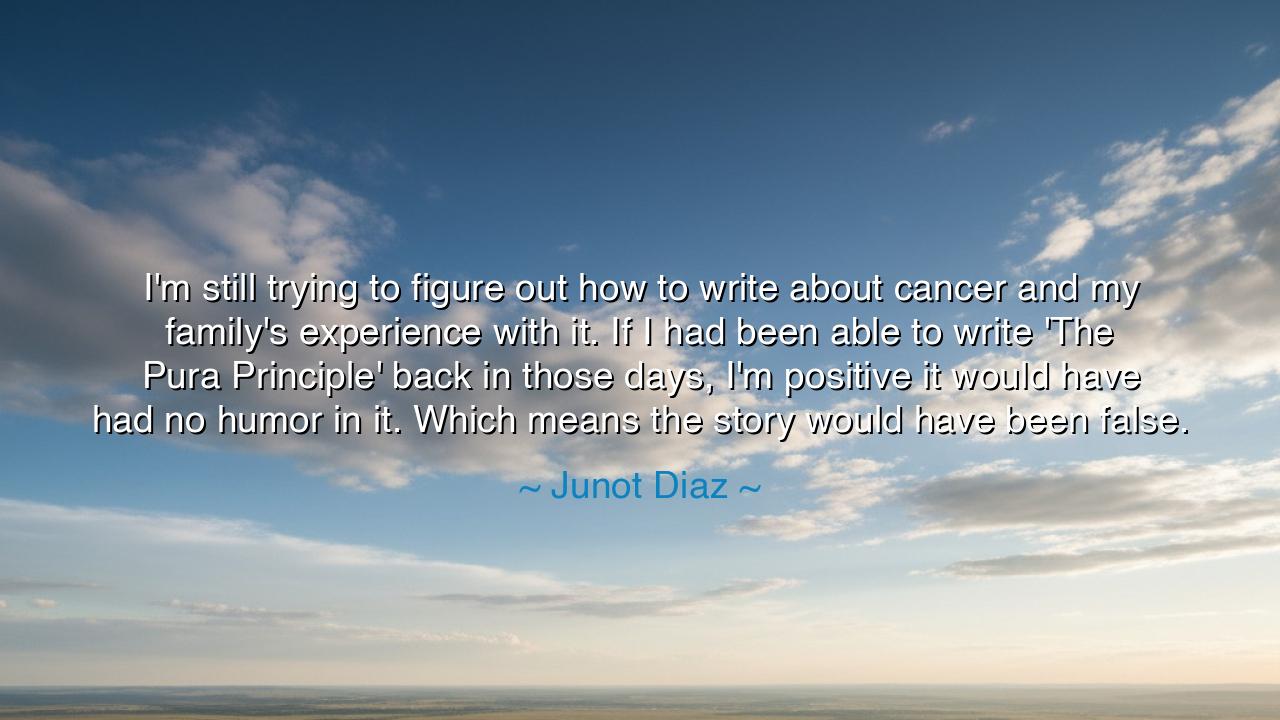
I'm still trying to figure out how to write about cancer and my
I'm still trying to figure out how to write about cancer and my family's experience with it. If I had been able to write 'The Pura Principle' back in those days, I'm positive it would have had no humor in it. Which means the story would have been false.






Hear now, O Children of the Earth, the words of Junot Díaz, a writer of great power and insight, who reflected upon his own struggle with the weight of sorrow and the need to express it. He spoke thus: "I'm still trying to figure out how to write about cancer and my family's experience with it. If I had been able to write 'The Pura Principle' back in those days, I'm positive it would have had no humor in it. Which means the story would have been false." These words are not mere reflections of a writer's challenge—they are a profound meditation on the human condition, the way in which suffering is woven into the fabric of life, and the need for humor as both a shield and a light in the darkest of times.
What, then, is the meaning behind these words? Díaz is acknowledging a truth that many of us understand deeply: suffering is an inevitable part of life, and yet it is often through the lens of humor that we find a way to survive it. Cancer, a shadow that looms large in many lives, is a disease that brings grief, fear, and loss. Yet, Díaz tells us that in the face of such a trial, the absence of humor would have made his story false—for in that absence, there is no acknowledgment of the fullness of life. We are not simply creatures of sorrow, but also of laughter. Humor, in its deepest sense, allows us to transcend the heaviness of existence, to find joy even in the most tragic of circumstances.
Let us consider the wisdom of the ancients, who understood the power of humor as both a catharsis and a revelation. The ancient Greeks, with their tragedies and comedies, saw the value of balance in storytelling. In works like Sophocles' Oedipus Rex or Euripides' The Bacchae, we witness the human soul navigating through suffering, yet even in tragedy, there are moments of sharp wit and irony. These moments, though fleeting, remind us that even in our deepest despair, there is room for light. Díaz, too, seeks that balance—he acknowledges the profound grief that cancer brings, but he also insists that humor must be part of the narrative, for without it, the story would not be whole.
There is, perhaps, no greater testament to the power of humor in the face of suffering than the story of Viktor Frankl, the Austrian psychiatrist and Holocaust survivor. Frankl, in his time in the concentration camps, witnessed the depths of human suffering, yet he wrote in his seminal work Man's Search for Meaning that the will to find meaning in the most dire of situations was the key to survival. Frankl also spoke of the power of humor in the face of suffering—how, in the darkest moments, those who could laugh were often the ones who found a way to endure. For Frankl, as for Díaz, humor was not an escape from suffering, but a means of confronting it with dignity and grace.
In this light, we must understand that humor is not simply the tool of the lighthearted, but the armor of the resilient. Díaz's words remind us that humor is an act of survival, a way to keep the soul intact when the body and mind are being torn apart by grief. To be able to write, to create in the midst of pain, and to infuse that creation with humor, is an act of bravery. It is a refusal to be consumed by darkness, a choice to find light even in the deepest shadows. And through this choice, we see that the human spirit is never fully broken, no matter how intense the suffering.
The lesson here, O Children of the Earth, is that in our own lives, we must not shy away from the sorrow, the pain, or the challenges that life sets before us. For these experiences are not only real but necessary. Yet, we must also embrace the lightness that humor brings. Laughter, as Díaz suggests, is not a denial of suffering; it is a recognition that we, too, are part of something greater than the pain we endure. Humor allows us to reclaim our humanity, to laugh even in the face of what seems insurmountable. It is through this embrace of both darkness and light that we find wholeness.
And so, O Children, take this wisdom with you: suffering is inevitable, but humor is a choice. Let us choose to see the world through both the lens of sorrow and the lens of joy. Let us learn to laugh, even when our hearts are heavy, for in that laughter, we find the strength to endure and to rise above. Just as Díaz seeks to write the truth of his family's experience, so too must we live our lives with both authenticity and lightness, knowing that humor is the thread that connects us to one another, and the strength that carries us through life’s most difficult trials.






AAdministratorAdministrator
Welcome, honored guests. Please leave a comment, we will respond soon